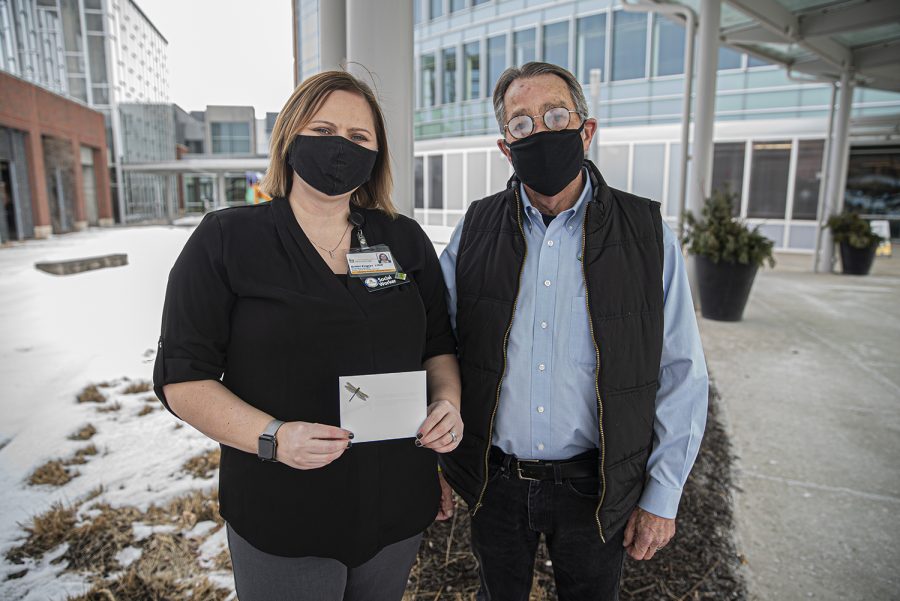Dragonfly Transplant Fund extends support to transplant patients and their families
The Dragonfly Transplant Fund takes flight with a new project underway and a vision to serve patients and caregivers undergoing the transplant process.
Dragonfly Transplant Fund co-founder Ed Brown and social worker, Brittni Engrav pose for a portrait in front of the Iowa River Landing in Coralville on Saturday, January 24th 2021. The Dragonfly Transplant Fund was founded by Ed and his wife Deb who would use the program to reward organ donors with gift cards. (Tate Hildyard/The Daily Iowan)
January 27, 2021
After forty years of marriage, one of Ed Brown’s favorite moments spent with his wife Deb happened after her liver transplant operation in 2016. Following months of anxious waiting and an eventual life-saving procedure, Ed said that Deb was able to load into her wheelchair, order a cup of coffee, and experience a small taste of normalcy.
Following Deb’s transplant operation, the couple created the Dragonfly Transplant Fund to raise money, support transplant patients and their caregivers, and encourage organ donation.
The Dragonfly Transplant Fund has continued its mission since Deb’s death from pancreatic cancer complications in May.
In early January, Brown started a gift card program through the University of Iowa Hospital and Clinic’s Transplant Center that distributes two $5 gift cards to transplant patients and their families to use at any of the four Bread Garden Market Cafe locations in the hospital. Brown intends to donate 500 of these gift cards.
Brittni Engrav, a social worker in the abdominal transplant center, will be handing out the gift cards to the transplant patients and families alongside other social workers. Engrav thinks Brown’s gift card project will offer comfort to many people who share his experiences at the hospital.
“It is a hard responsibility being a caregiver to a transplant patient. It’s a marathon, not a sprint,” Engrav said. “Support from people who have been through [the transplant process] is invaluable. We see it through our eyes here as workers at the transplant center, but someone who has actually lived through it — who can speak about it and provide support — is really vital.”
Brown says he was encouraged to start the gift card program because of the impact small victories — like ordering a cup of coffee from the hospital’s coffee shop — have on transplant patients’ recovery.
The University of Iowa Hospitals and Clinics’ Medical Director of Digestive Health and Liver Transplant Clinics, Alan Gunderson, formed a bond with the Brown couple throughout Deb’s transplant journey. Gunderson said that he found Deb’s joy at ordering a cup of coffee post-procedure inspiring.
“You know, it’s just a cup of coffee. It may seem ridiculous, but just leaving the room and the floor, and doing something that seems or feels normal, is so humanizing,” Gunderson said. “Deb knew that, and Ed knows too. They know better than we will because they’ve lived through it — and when you live through it, your perspective is different — and in some ways, more complete.”
Although Brown agrees that every small victory counts in both recovery and fundraising, he has a preeminent vision for The Dragonfly Transplant Fund’s efforts.
Following Deb’s liver procedure, Brown started fundraising for a lounge in the University of Iowa Hospital’s transplant wing for the caregivers and loved ones of transplant patients.
Brown first reached out to Alan Reed, director of the UIHC Organ Transplant Center, about his hopes to construct a family and caregiver lounge into the hospital’s transplant center.
“Ed and Deb seized onto the need for caregivers to congregate, learn, and relax. They wanted to have an area for them to have all those opportunities,” Reed said.
Reeds added that The Dragonfly Transplant Fund has raised sufficient funding, and the hospital is identifying an appropriate space for renovations so that the respite area can become a reality.
Although Brown is motivated by his goal to support transplant patients and their caregivers, he misses his Dragonfly Transplant Fund co-founder.
Brown said that on Mother’s Day afternoon, Deb was in the hospital due to pancreatic cancer. While speaking to Deb on the phone that day, she requested that he write down the flowers she wanted to be planted in their garden.
“Ten minutes after I hung up the phone, God showed up and said, ‘Deb, you’ve had enough suffering. There’s no more you have to go through’, and she passed away,” Brown said.
While Brown considers it a blessing that his wife no longer endures suffering, he said he likes to reflect on their memories spent traveling and giving back to the community. Brown also finds joy in the many memorable qualities that made Deb special.
“Deb loved to entertain, and she loved animals. I mean, she taught squirrels how to take peanuts out of her hand and stuff like that. She made people feel special one way or the other,” Brown added.
Regardless of loss and tribulation, Brown said he knows that the Dragonfly Transplant Fund will continue to shape transplant patients’ and caregivers’ lives.
“This is how we can impact the most people over a long period of time,” Brown said. “And it’s going to live on. Not just past Deb, but past Deb and Ed.”




















